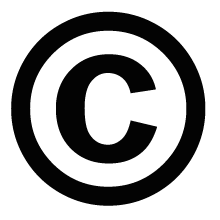A couple of weeks ago, I
attended an end of the year Continuing Legal Education seminar which featured
two respected Nashville attorneys, Jim Harris and Richard G. Sanders discussing an ongoing
copyright infringement case they were involved in. The case was a bit technical and the
discussion initially focused on aspects of the Digital Millennium Copyright
Act. I was about to fall victim to one
of those mid‑afternoon slumps when the discussion suddenly turned to the
dreaded Section 411(a) of the Copyright Act.
I was surprised to discover that the plaintiff’s attorney
in this case had fallen victim to the same procedural problem I had recently
faced. Section 411(a) of the
Copyright Act states that “no civil action for infringement of the copyright in
any United States work shall be instituted until preregistration or
registration of the copyright claim has been made in accordance with this
title.” Thus, as we constantly tell our clients
and students, while your copyright
exists from the moment the work is first fixed in a tangible medium of
expression, you can’t protect it (i.e. you can’t get into court) until the work
is actually registered.
What does this actually mean? There is a split in the federal circuits as
to what it takes to satisfy the registration requirement. In the 9th
Circuit, the registration requirement is met once the owner files the
application to register the work with the copyright office. Unfortunately our circuit, the 6th
Circuit currently follows the narrower approach, which requires the actual
completion of the registration process before a plaintiff is allowed to proceed
with his or her lawsuit.
The odd part of this whole scenario is that
Section 411(a) allows a party to go forward with a lawsuit even if the
registration is refused. Many commentators,
including Nimmer have pointed out that if such is the case, the 9th
Circuit approach makes the most sense.
The problem of course is that the registration process
can take a long time (especially in this era of government shutdowns and
sequesters) and the damage caused by an infringer can be potentially fatal
while the applicant waits for his registration certificate. (There is an expedited registration process
but many would find the fee $760.00 to be cost prohibitive.)
I guess the policy argument here is that Congress
intended to encourage registration by making it a prerequisite to filing an
infringement lawsuit but it appears that many copyright owners choose not to
register their work – or in some cases are not even aware that their work is
protected by copyright until an actual infringement has occurred.
In the case I was involved in, the court initially
dismissed our complaint for infringement without prejudice. (this means that we
could refile the lawsuit as soon as we received the registration certidicate). I filed a motion to reconsider and while the
court was considering this motion my registration certificate magically
appeared, allowing the case to proceed to a successful conclusion. Nonetheless I think that the requirement of
actual registration under Section 411(a) is an outdated unworkable
restriction which has the unintended consequence of causing harm to many
plaintiffs. In this context, the 9th
Circuit position seems much more fair. Congress should amend this section of
the Copyright Act.

No comments:
Post a Comment